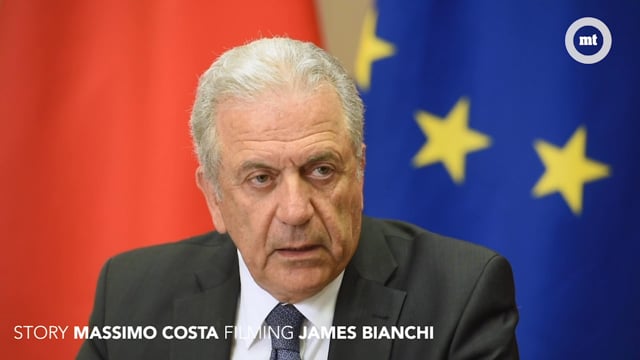[WATCH] European Commissioner hails Malta for having shown 'most solidarity' on migration
Dimitris Avramopoulos commended Malta for being one of the main proponents of the EU's policies on migration and security


The European Commissioner for migration has commended Malta's response to irregular migration across the Mediterranean, saying the island has shown the most, despite its small size.
Dimitris Avramopoulos, who is currently in Malta, said the country was facing "great migration challenges" compared to its population size.
He acknowledged that while irregular arrivals had decreased in the European Union on the whole, local arrivals had increased in 2018.
Avramopoulos said during a press conference on Tueday that member states had also show solidarity with Malta, noting that 80% - or 575 of 687 - of migrants who had been taken in unto Maltese shores over the past year had been relocated.
"Without a doubt, Malta is facing great migration challenges compared to the size of the population. Overall, at the EU level we have returned to pre-crisis levels of irregular arrivals, but in Malta arrivals increased in 2018 due to search and rescue operations in the Mediterranean and the volatile and precarious situation in Libya," Avramopoulos said.
"Only a few weeks ago the episode of the NGO ship Alan Kurdi was once again an opportunity to commend and praise Malta for being the smallest member state with the biggest solidarity."
He said that the ad hoc solidarity shown by other EU countries would allow member states "to rebuild confidence and move forward with the common European asylum system", also highlighting that "fast and more immediate results" were needed in this area.
"Many focus on disagreements on the migration issue at EU level, but collectively we've made more progress in terms of migration and security in recent years than we have did in the decades prior," he noted.
Asked by MaltaToday on the challenges which the new European Commission - due to be appointed later this year - might face in light of the rise of populist rightist parties and the expected gains these will make in the European Parliament elections, Avramopoulos said that while it wasn't possible to accurately predict the results of the elections, he didn't feel that the future would be as bleak as some analysts were predicting.
"We cannot predict in an accurate way what the political landscape will be after the upcoming European elections... it remains to be seen. The European Commission, however, has open channels for communication with all member state governments. This said, while we are ready to cooperate with member states, we do not interfere in the domestic sphere," he said.
"We look forward to increasing cooperation with all EU government in terms of our common goal of defending the Union's principles. Our migration strategy is built on these founding principles. Hopefully the future won't be as dark as is being depicted in the European analysis. In the end, I'm sure European and national interests will prevail."
All involved parties should work to restore stability in Libya
Touching on the increased hostilities in Libya, Avramopoulos said the Libyan situation was "dire". The EU's priority, he said, was to prevent people risking their lives on dangerous journeys to leave Libya, together with its efforts to evacuate any people who were in need of international protection.
"Our policy is very clear. We urge all parties to work together to bring national unity and stability back to Libya," he added.
Commissioner's views aligned with Malta's
Home Affairs Minister Michael Farrugia said his and the Commissioner's views on issued related to migration and security were in alignment.
"I would like to thank president Juncker, Commissioner Avramopoulos and DG Home with regards to all the assistance given to Malta in a number of areas and circumstances, where it sometimes wasn't our responsibility to coordinate, but when we nevertheless assisted on a humanitarian level,” he said.
“It was in these situations that we found President Juncker and the Commissioner working hand in hand with Malta to save people who were at sea and who needed assistance."
The minister said his discussions with Avramopoulos had focused on migration, Libya and strengthening the European border coast guard.
"In terms of security, we discussed extensively cooperation amongst EU countries and with agencies such as Europol, which have been of assistance to Malta," Farrugia said, adding that efforts would continue to be directed towards fighting smugglers whose operations often ended up funding terrorism and criminal gangs.




.png)

.jpg)
















